The 25 Greatest Sports Movies of All Time, Ranked
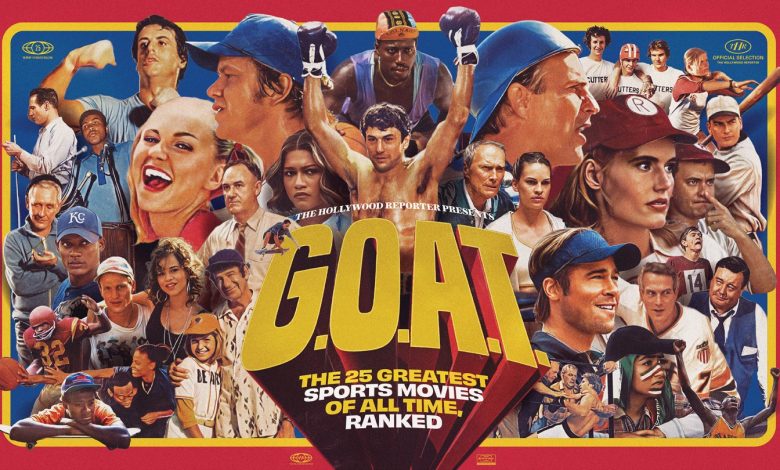
It’s rare that a sports movie is just a sports movie.
Through the prism of athletics, sports movies are love stories and tales of the underdog, opportunities to process war and addiction and immigration and euthanasia and economic inequality. They’re showcases for our biggest stars, our pluckiest protagonists, our most virtuoso directors, and even the occasional golden retriever allowed on the court by a rule-book loophole. They reflect our complicated past and predict our dystopian future. They speak a language understood around the globe.
For the purposes of this list, a panel of six THR critics started with an initial field of roughly 100 movies, whittling that number to 25 and then ranking them. Like sports themselves, the process provoked much passion and a bit of heartbreak.
Baseball is our most represented sport, landing six spots on the list. Boxing and basketball had good showings, with five and four entries, respectively. Track, tennis, hockey, cheerleading, pool, cycling and skateboarding feature in our selections, too. A lone auteur, Ron Shelton, scored two slots — not entirely surprising given that he’s a former minor-league infielder.
As for the wealth of quality sports programming made for television — the likes of Pitch, Friday Night Lights and Welcome to Wrexham will have to wait for a list of their own.
-
“”
‘The Bad News Bears’ (1976)
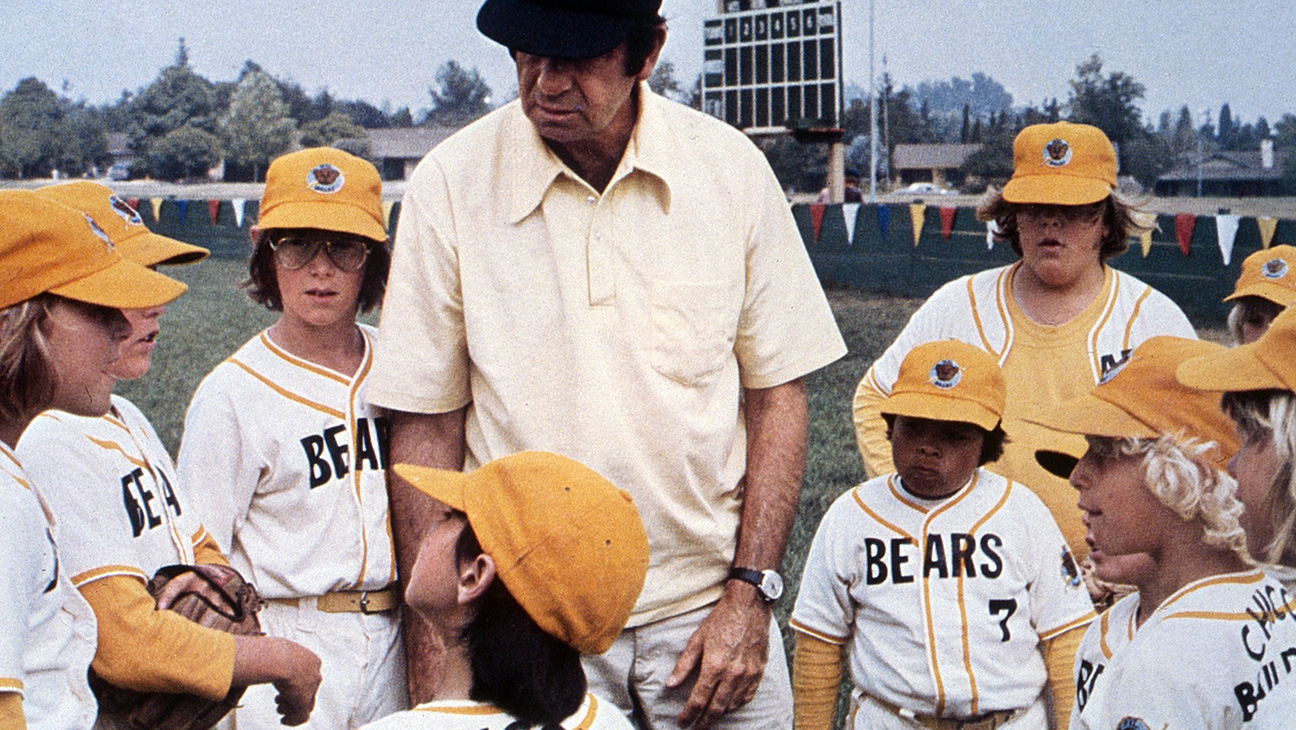
No less capable a filmmaker than Richard Linklater proved, with his lifeless 2005 remake, what an unlikely feat of alchemy this not-for-kids “kids movie” — about a Little League team of outcasts and misfits — truly was. The coach (Walter Matthau, masterfully callous and disheveled) is an alcoholic. The players flirt with racism, antisemitism and tobacco use. The lessons, though eventually warm and fuzzy, are buried in a subversive storyline. Director Michael Ritchie’s confidence with the tricky tone is impeccable, and the casting, especially of the young actors (including Tatum O’Neal and Jackie Earle Haley), is top-notch. Plus, The Bad News Bears has an absolutely perfect ending — one of the best ever for a sports movie without reality to rely on.
“”
-
“”
‘Challengers’ (2024)
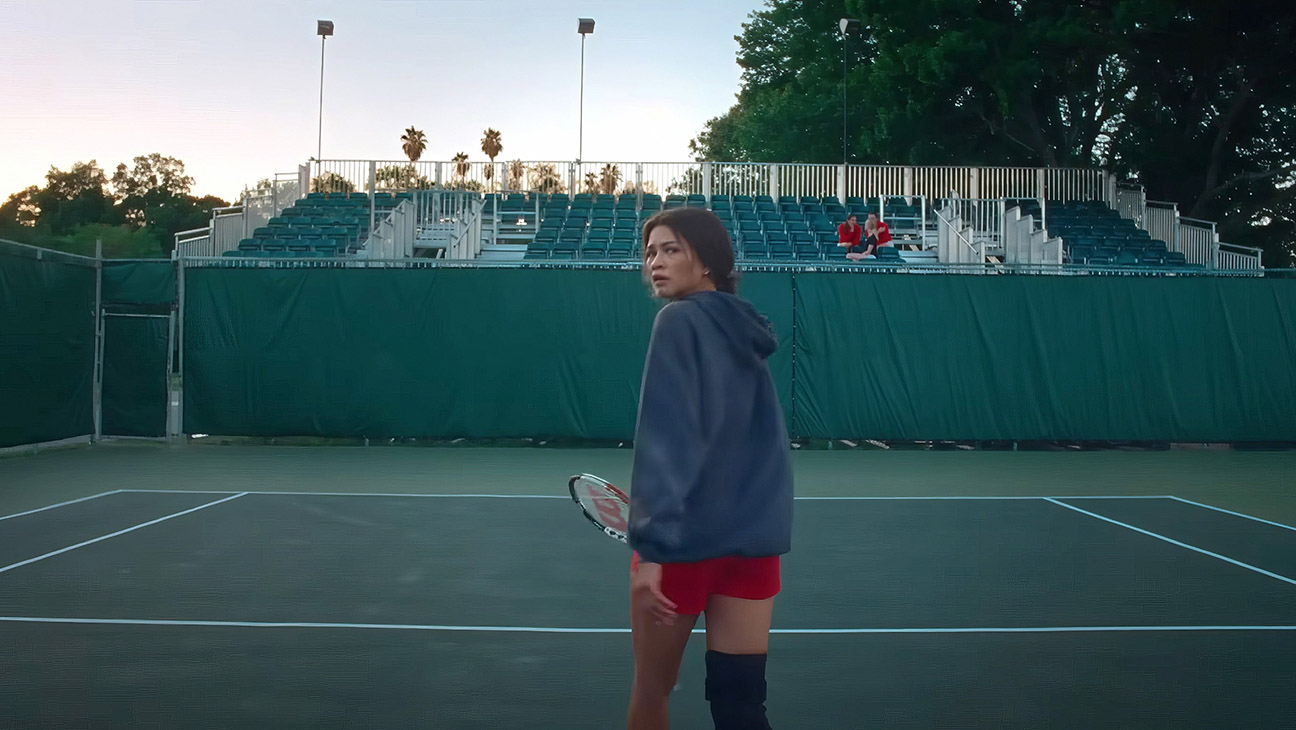
By definition, sports are physical. Still, it’s rare to see one as exhilarating in its physicality as this drama about the years-long bond among three elite tennis players, portrayed with playful sex appeal by Zendaya, Josh O’Connor and Mike Faist. Director Luca Guadagnino delights in the sight of bodies in motion: sweating, straining, brushing up against each other or pointedly not doing just that, as in a literally steamy sauna scene. In fact, it takes a beat to notice that the romantic scenes aren’t actually that explicit; instead, Justin Kuritzkes’ script draws the connection between the primal drives of sport and those of love and lust. “It’s a relationship,” Zendaya’s Tashi says of a recent match. “It’s like we were in love, or like we didn’t exist. We went somewhere really beautiful together.” Challengers gets you there without asking you to leave your seat.
“”
-
“”
‘Million Dollar Baby’ (2004)
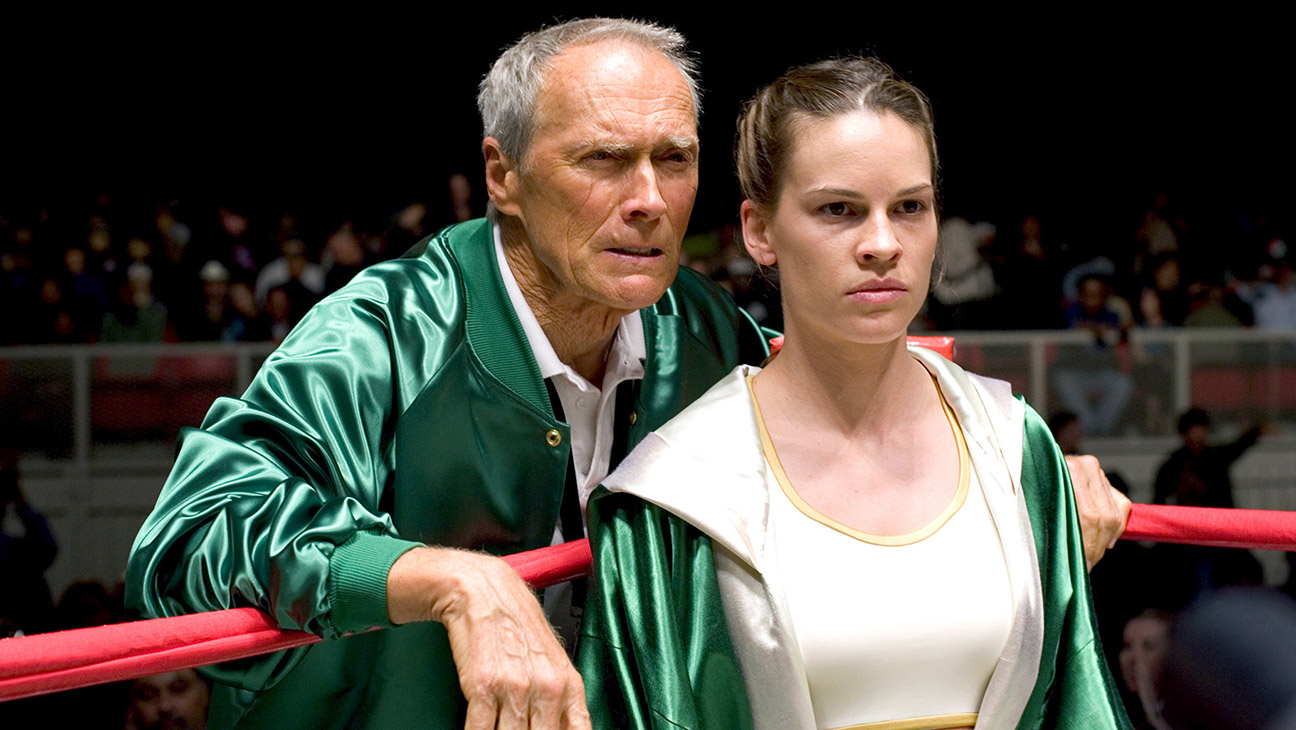
Clint Eastwood’s magisterial melodrama about a boxing trainer, his right-hand man and the female fighter they mentor coaxes sports movie conventions into something that feels miraculously one of a kind. Working from Paul Haggis’ script based on a collection of stories by F.X. Toole, Eastwood nimbly jabs at themes of faith, mortality, guilt, poverty and salvation. But Million Dollar Baby is really about love — the unexpected bonds that tether us, what it means to care about someone, the counterintuitive forms that care can assume. The film lures you with the ticklish pleasure of watching an underdog’s rise, then takes a swerve into darkness that would feel cheap if it weren’t seen through with such shattering tenderness. Tom Stern’s chiaroscuro cinematography and the wistful ache of Eastwood’s score are indelible, but it’s the performances that give this best picture Oscar winner its wounding force and purity. Hilary Swank locates a piercing sadness beneath her spunk, while Eastwood and Freeman pick at each other in a duet of sublimely cranky devotion. It’s a movie about people with nothing to lose, made by an artist with nothing to prove.
“”
-
“”
‘Slap Shot’ (1977)
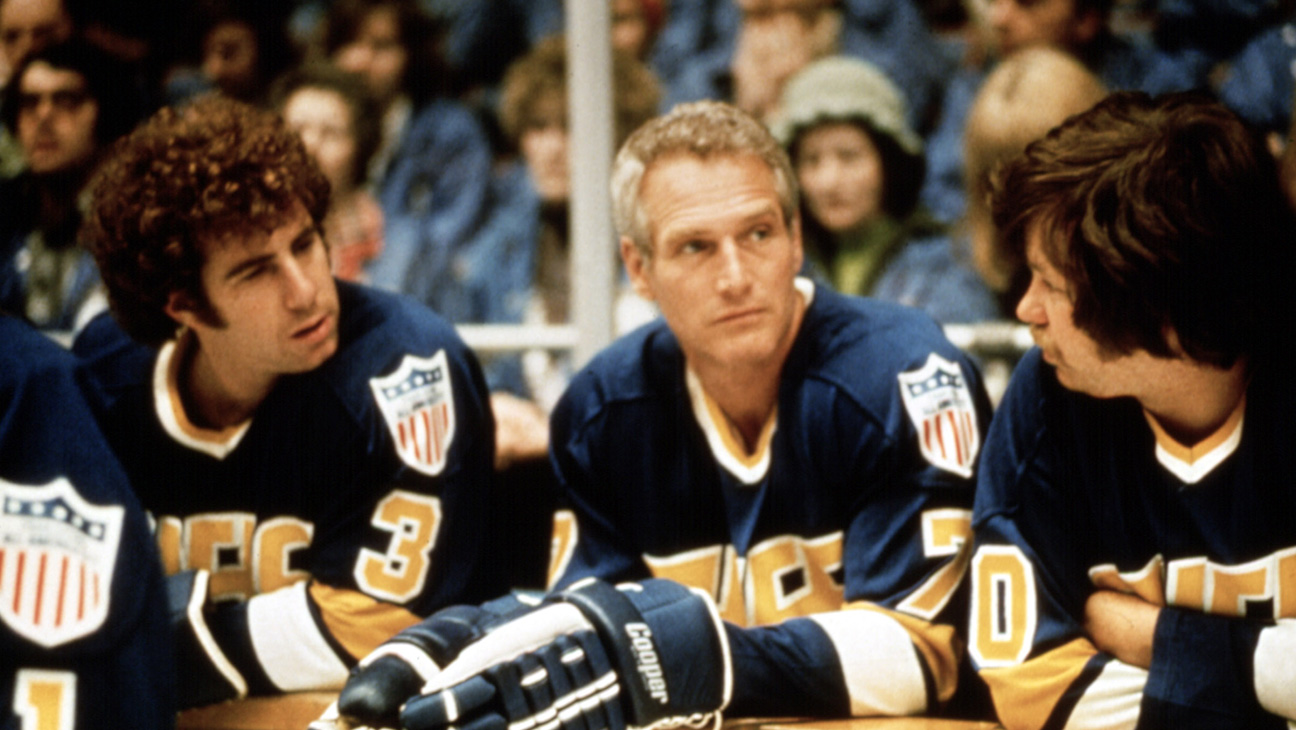
Not every aspect of writer Nancy Dowd and director George Roy Hill’s hockey comedy holds up under a 2025 gaze, particularly if you take the main characters’ sexism and homophobia to represent the film’s perspective. That would be a mistake. Slap Shot is a story of arrested development, of boorish antiheroes whose desperate desire to remain part of a disreputable game is embodied by a rarely better Paul Newman. When you have a star as boundlessly charismatic as Newman, you can push boundaries, and Slap Shot is uncouth by any standard. It’s also exuberantly affectionate toward its central sport and its athletes, who are fighting — literally — to save their minor league team in their dying Rust Belt town. Because of its speed, brutality and regional specificity, hockey is one of the harder sports to bring to the screen, but Slap Shot reverberates with authenticity.
“”
-
“”
‘Moneyball’ (2011)
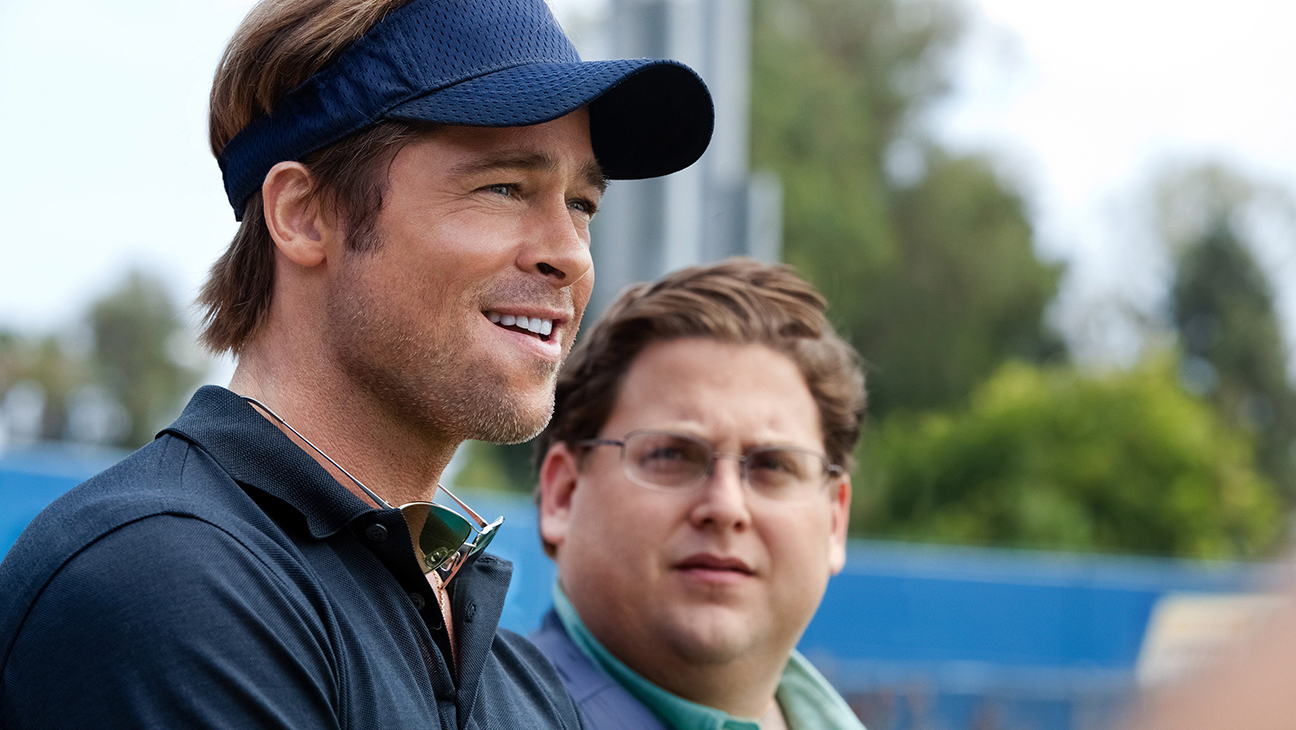
In an era when pro sports teams have become the playthings of finance fat cats, Bennett Miller’s film offers a thrilling true story of how one crafty baseball manager used the stats to take on the big guys. Based on Michael Lewis’ best-selling account of Oakland A’s frontman Billy Beane, who hired a young economist to turn his squad’s shoestring budget into a stockpile of talent, the razor-sharp movie is less about heroics on the field than the guts and glory of the back office — about sports entering the Information Age. In one of his most vulnerable turns, Brad Pitt portrays Beane as an iconoclast with a gaping hole in his private life, while Jonah Hill winningly plays a polite number-cruncher who became the A’s one-man brain trust. Together, their characters changed baseball history: for the better, in that teams with less money could finally compete with billion-dollar franchises; and for the worse, as algorithms have come to dominate America’s favorite pastime.
“”
-
“”
‘Fat City’ (1972)
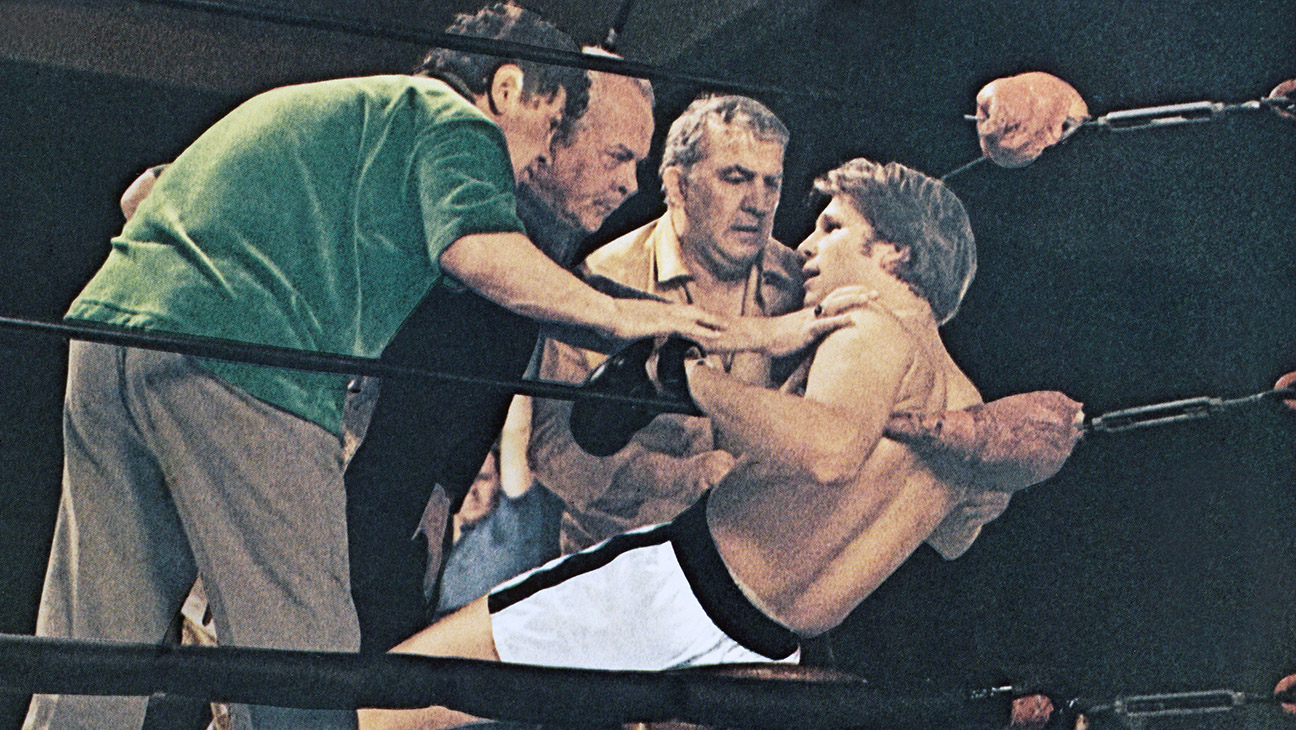
The unsung champ of boxing movies, John Huston’s downbeat fight flick follows an aging pugilist (Stacy Keach) trying to stage a comeback in Stockton, California. Adapting Leonard Gardner’s unflinchingly realistic novel, Huston never shies away from the uglier sides of pro fighting, whether it’s the way boxers old and young (the latter embodied by Jeff Bridges as a talented upstart) are constantly exploited or how the violence they dish out between the ropes often extends to their home lives. There are no winners in Fat City, even when someone knocks out their opponent. At best, there’s the camaraderie of working-class warriors trying to stay afloat in the lower depths of America.
“”
-
“”
‘Personal Best’ (1982)
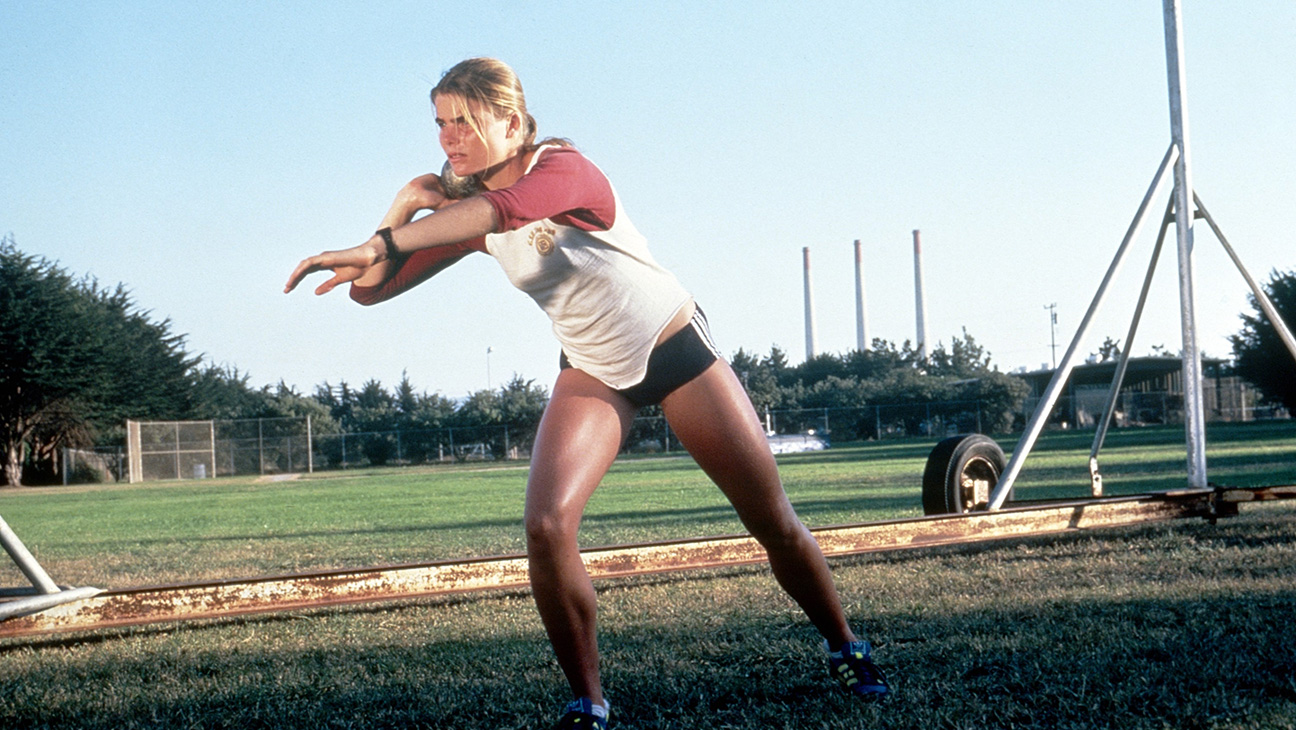
Chinatown screenwriter Robert Towne made his directing debut with this drama, a way-ahead-of-its-time exploration of the price that sometimes must be paid to achieve athletic greatness. The relationship between track stars played by Mariel Hemingway (heartbreakingly innocent) and Patrice Donnelly (effectively unstudied) is handled with far more nuance than most LGBTQ+ storylines of the period, and Scott Glenn is creepily excellent as the demanding coach who comes between the two. But really setting the film apart is Towne and cinematographer Michael Chapman’s eye — simultaneously prurient and reverential — for physicality. The movie is a symphony of twitching muscles and torquing limbs, an obsessed examination of the mechanics of excellence.
“”
-
“”
‘Love & Basketball’ (2000)
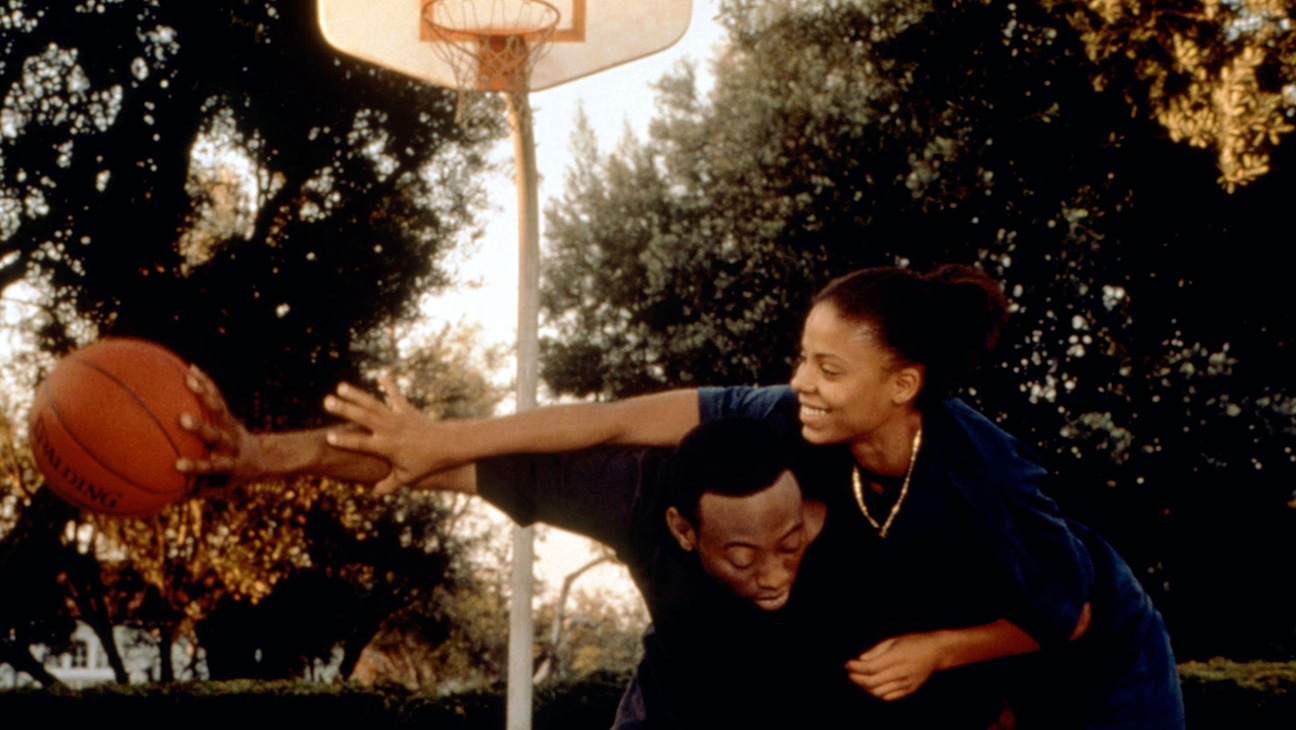
Before Caitlin Clark or Angel Reese, there was Monica Wright, played with graceful strength and disarming vulnerability by Sanaa Lathan. Like many films on this list, Gina Prince-Bythewood’s drama is an impassioned portrait of athletic ambition. Like very few, it’s a specifically Black and female spin on that theme, rooted in honesty about the challenges of making it as a female baller in a world that can seem awfully skeptical of them. It’s also a top-notch romance, charting the long, rocky, magnetic connection between Monica and equally sports-obsessed boy next door Quincy (Omar Epps), and culminating in the sexiest one-on-one b-ball game ever put to film. Notably, Prince-Bythewood declines to make Monica sacrifice one of her great loves for the other. In her film, our heroine can have it all.
“”
-
“”
‘Hoosiers’ (1986)
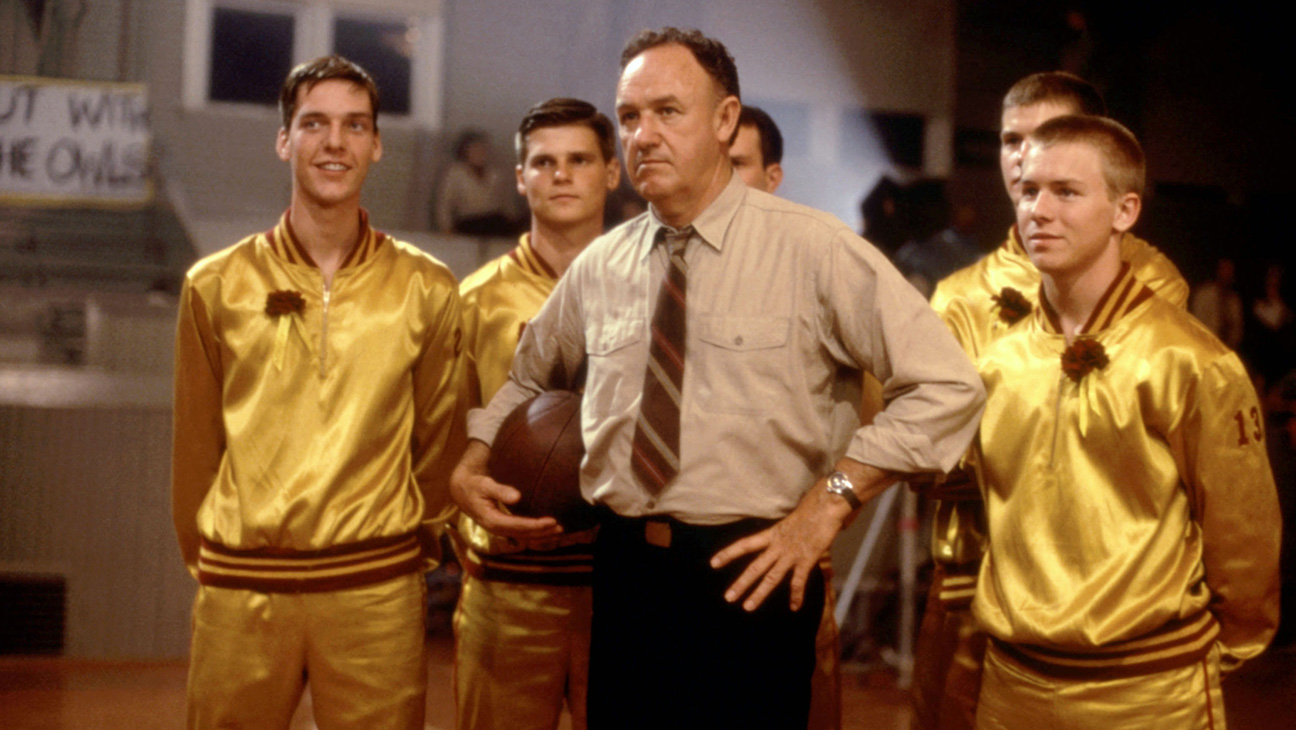
Writer Angelo Pizzo and director David Anspaugh may not have created most of the archetypes that drive this story of a small-town Indiana high school basketball team’s run to the state championship, but their film feels like the genre’s ultimate blueprint. Gruff, demanding head coaches get no gruffer or more demanding than Gene Hackman’s Norman Dale. Fragile, damaged wild cards get no more fragile and damaged than Dennis Hopper’s Shooter. From Fred Murphy’s location photography to the rousing score by Jerry Goldsmith, this is a gloriously earnest celebration of the overlooked human spirit — and a weaponized 105-minute countdown to a final five minutes guaranteed to make you cheer and cry. It works beautifully no matter how many times you’ve seen it or how many imitators you’ve sat through.
“”
-
“”
‘Minding the Gap’ (2018)
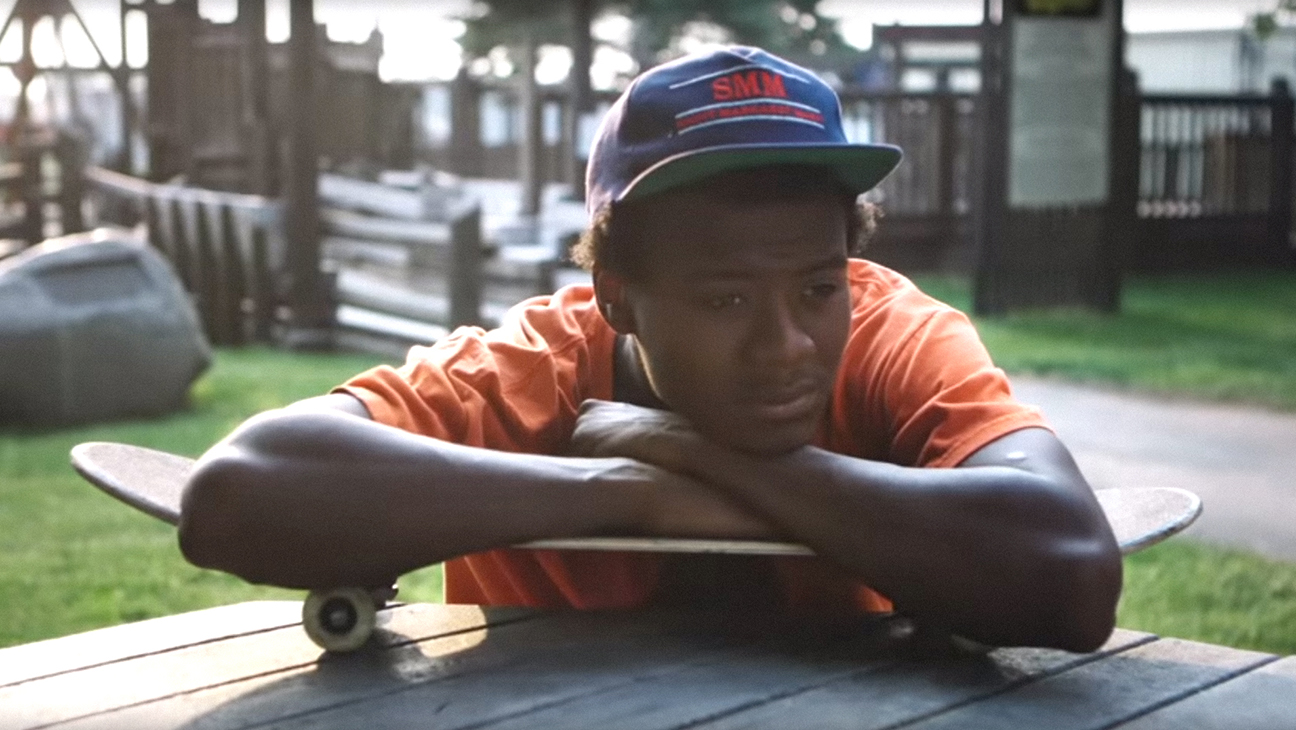
An intimate doc with the rippling textures of an epic narrative, this chronicle of the lives of three young Americans — one of whom is director Bing Liu — draws on more than a decade of footage. United by their love of skateboarding as an escape from their abusive homes in Rockford, Illinois, the friends forge paths to adulthood that all involve a painful reckoning with the past in a community where violence can become a generational legacy. The balletic shots of the trio on their boards performing ollies, heelflips and tailslides with effortless grace provide the background for an extraordinarily moving reflection on masculinity, class, race and economic disadvantage in 21st century America. Observed with rigorous emotional honesty, the film won the U.S. documentary special jury award for breakthrough filmmaking at Sundance in 2018 and was nominated for best documentary at the Oscars the next year.
“”
-
“”
‘The Hustler’ (1961)
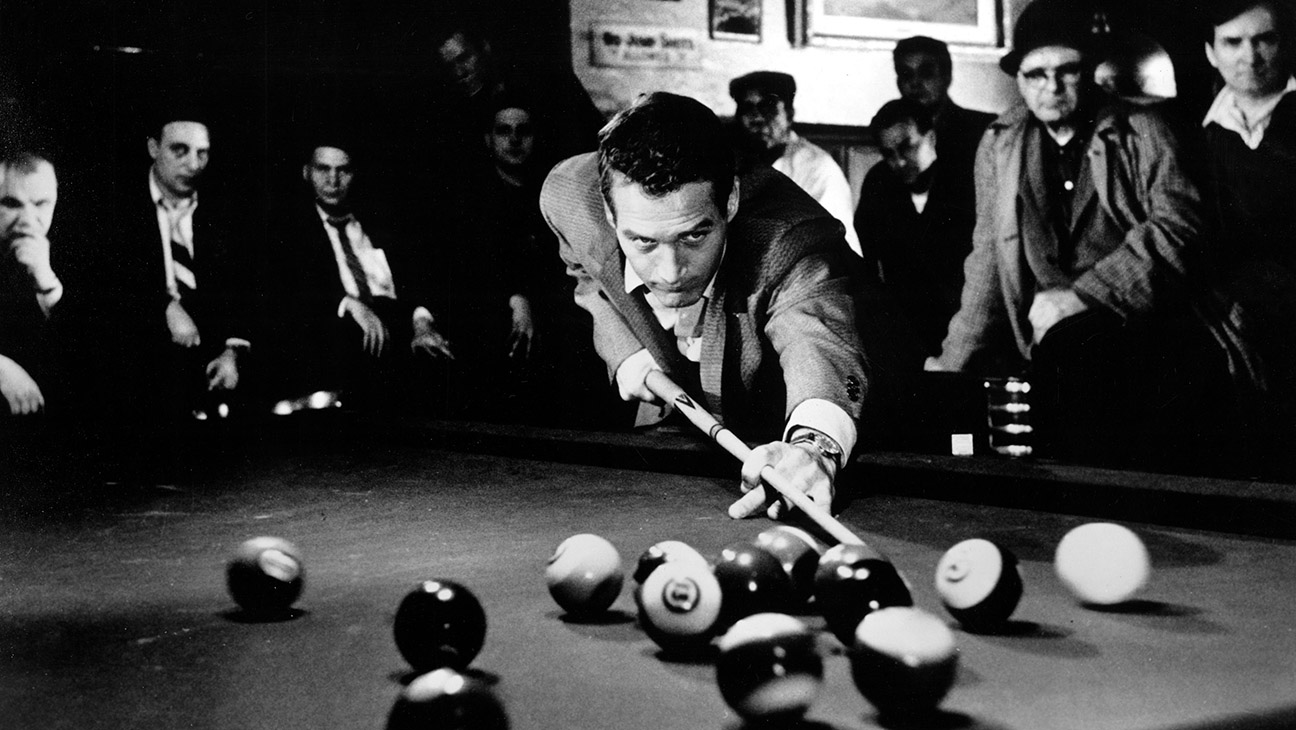
When Paul Newman was offered the starring role in Robert Rossen’s masterful pool-hall drama, he turned it down because of scheduling conflicts. Luckily Newman’s other project fell apart, allowing him to deliver arguably the best performance of his career. As hotheaded “Fast Eddie” Nelson, the actor not only exuded a coolness worthy of Marlon Brando or James Dean, he plumbed the emotional depths of a solitary young man experiencing love and loss for the first time. Rossen lensed his movie in real New York City billiards joints and populated it with down-and-dirty pool sharks — including Jackie Gleason of The Honeymooners, who executed his own shots as legendary Minnesota Fats. But it’s Piper Laurie who moves us the most, playing a lonely alcoholic holding herself together long enough to give Eddie the confidence he needs.
“”
-
“”
‘Offside’ (2006)
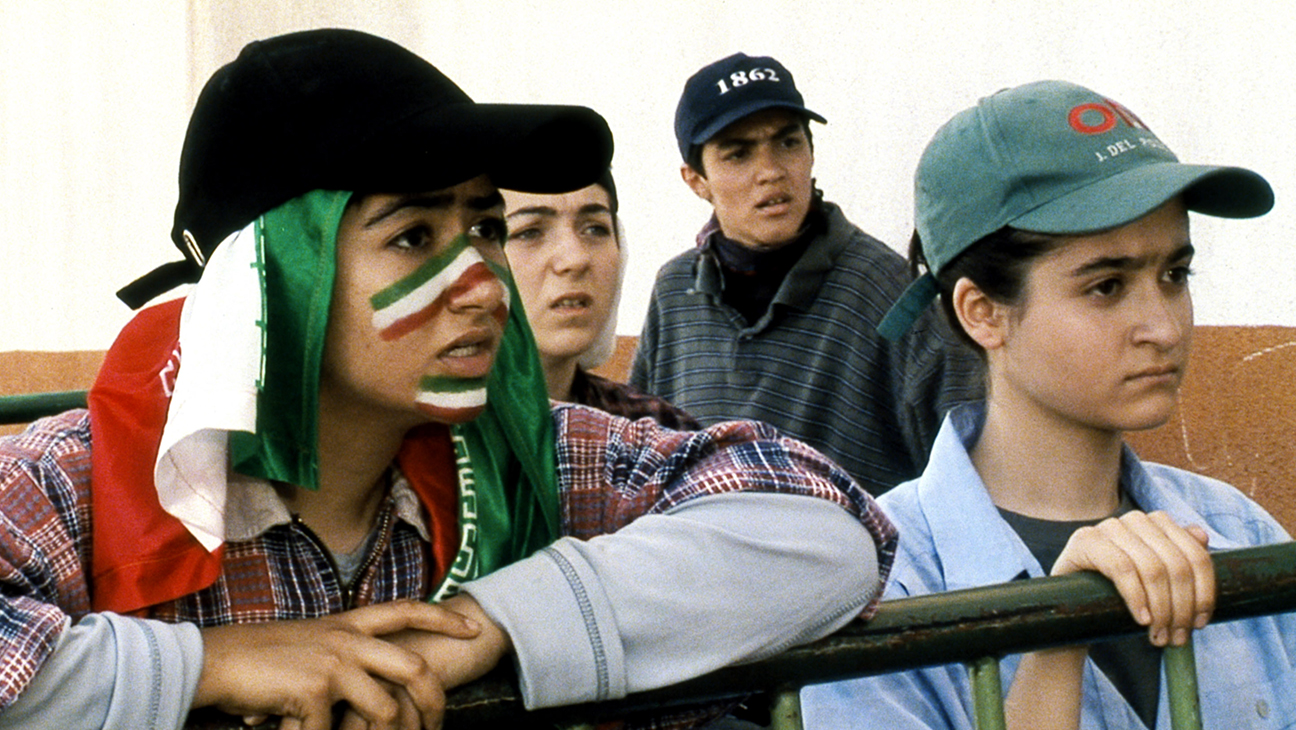
Jafar Panahi’s tour de force comedy-drama takes place at a Tehran stadium, where Iran is playing Bahrain in a qualifying soccer match to decide which country goes to the 2006 World Cup. There’s barely a glimpse of a ball or player, yet this may be one of the best films ever about fan passion and how love of the game can triumph over everything — perhaps, if only momentarily, even the repressions of patriarchy. We meet a gaggle of young women, all dressed as men, who’ve wrangled their way in to watch but have been arrested by soldiers and are being held in a makeshift pen at the back of the park. The comic tone mitigates the threat of the impending trip to the police station, and the stakes don’t feel as high as they would years later when the anti-hijab protests broke out. Still, the bravery of these women, and filmmakers, is painfully palpable and inspiring to this day.
“”
-
“”
‘Sugar’ (2008)
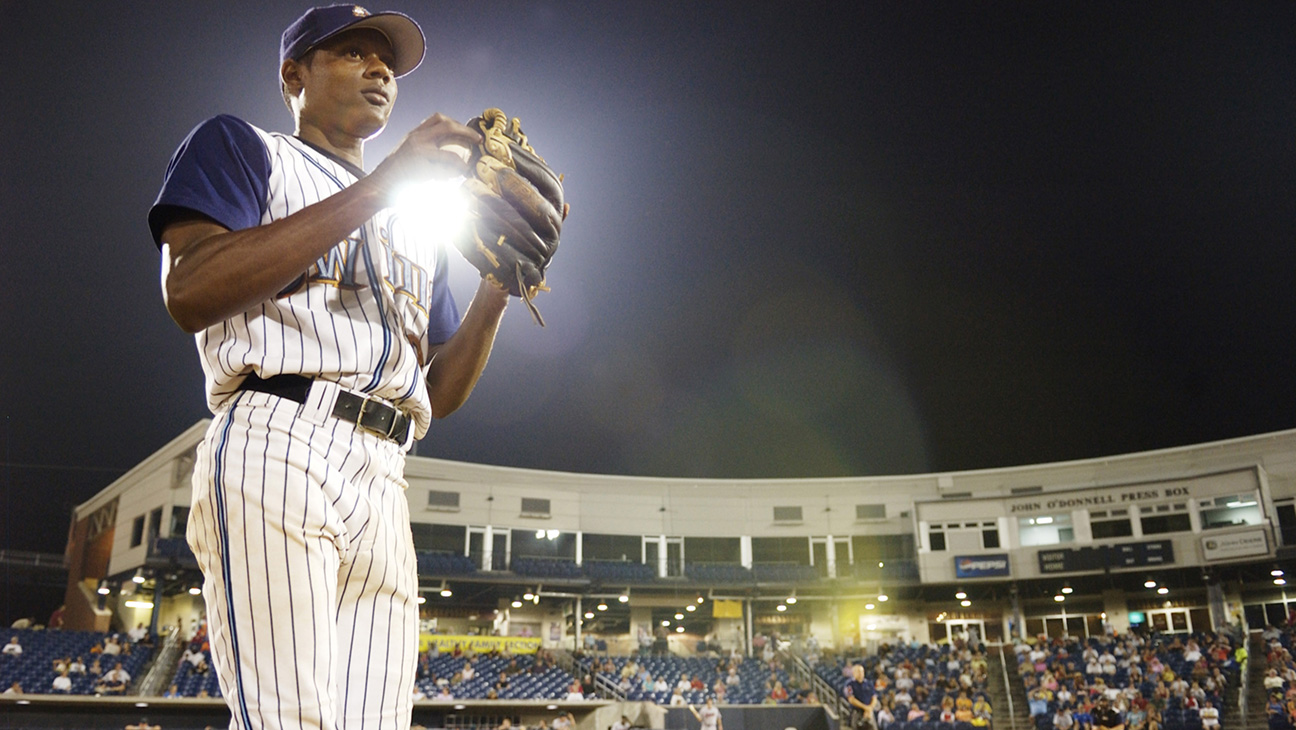
Anna Boden and Ryan Fleck’s exquisitely sensitive portrait of a Dominican pitcher (Algenis Perez Soto) struggling to make the leap to the majors from a minor-league club in Iowa is a corrective to all the glory-drunk narratives of athletic success out there. Examining the cold, hard realities that await most aspirants to the top tier of U.S. baseball, it’s also a great immigration film, capturing the lonely disorientation of pursuing such dreams when everything from diner menus to local church culture seems indecipherable. The baseball scenes are tense, though it’s off the field that the story’s meaning blossoms. An undertow of anxious melancholy intensifies, culminating in an NYC-set chapter at once crushing and restorative as it observes the protagonist trying to find purpose away from the diamond. You’ve heard Leonard Cohen’s “Hallelujah” in movies and shows before, but never as stirringly as it’s used here — a gorgeous Spanish cover by Chilean artist GEPE — in the penultimate moments of this stealthy stunner.
“”
-
“”
‘White Men Can’t Jump’ (1992)
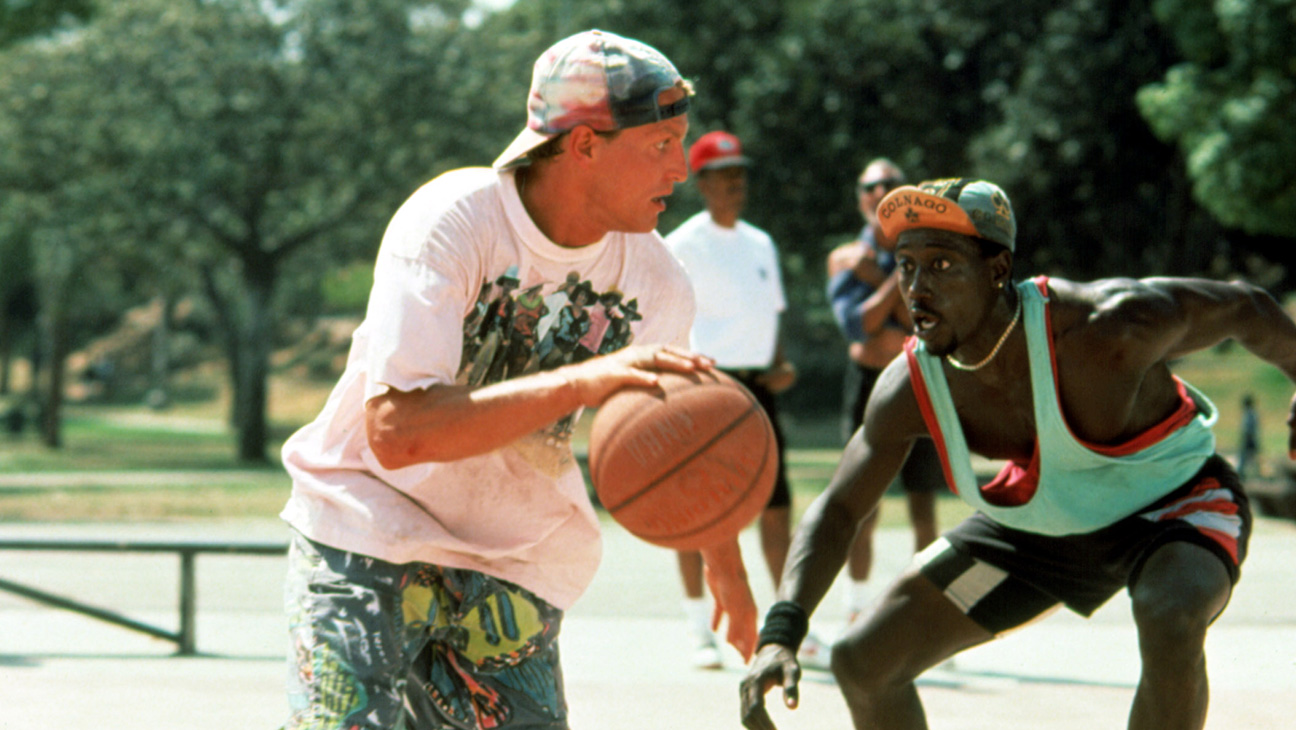
The hard-knocks playgrounds of Venice Beach and other parts of L.A. are the setting for Ron Shelton’s streetball classic in which Woody Harrelson and Wesley Snipes play trash-talking hustlers who team up to make fast money. The actors trained under NBA Hall of Famer Bob Lanier, and their b-ball skills are on display in a movie that captures the gritty feel of real pickup games. But this isn’t just a supremely entertaining sports flick — it’s a tragicomic bromance filled with catchy one-liners and tête-à-têtes, with Rosie Perez memorably playing a girlfriend who turns out to be more of a hustler than anyone. The film bristles with racial tensions defused via humorous ribbing and riffing, while the story goes on to illustrate that all men truly are created equal once they step on the court.
“”
-
“”
‘A League of Their Own’ (1992)
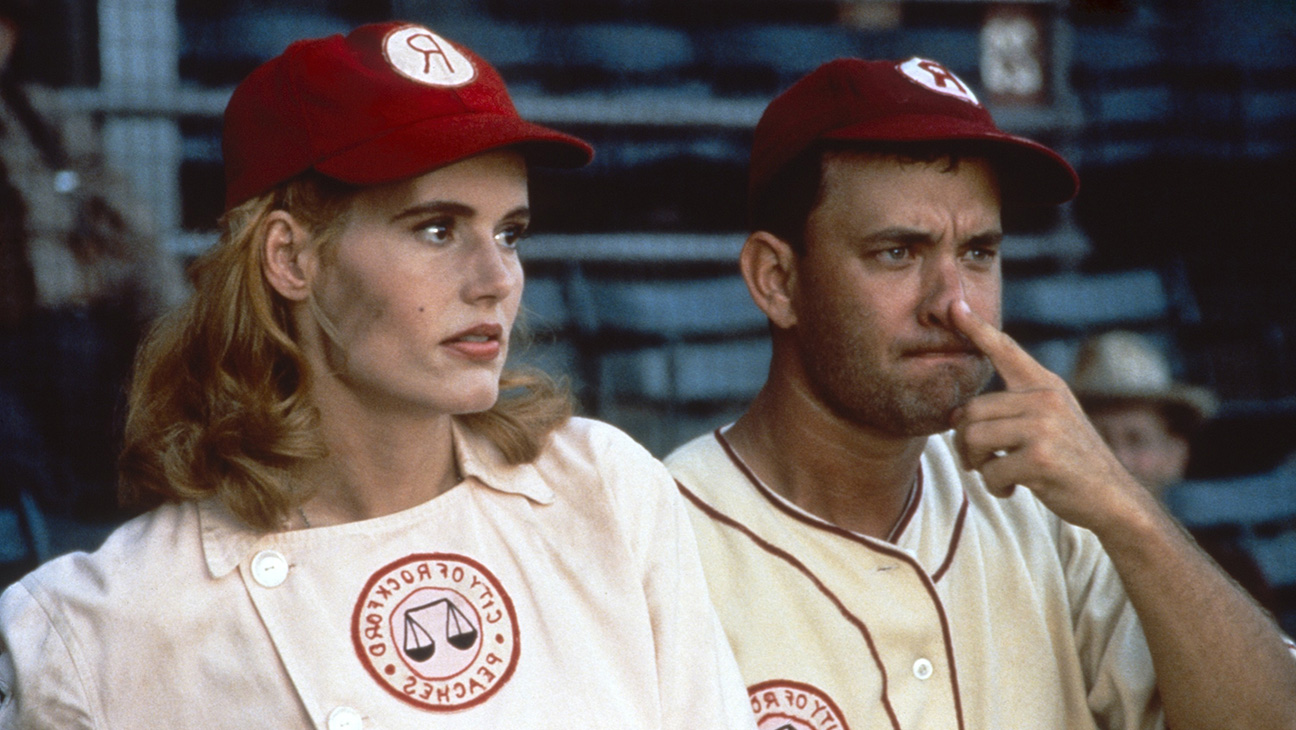
As the oft-repeated quote goes, “There’s no crying in baseball.” But even the most seasoned fan might find it hard not to get a little choked up watching Penny Marshall’s fierce, funny, moving classic about the All-American Girls Professional Baseball League, a short-lived midcentury relic best known today through this very film. While Tom Hanks and Geena Davis anchor the cast as the cantankerous manager and the composed star catcher, respectively, it’s the entire ensemble (Lori Petty! Rosie O’Donnell! Freaking Madonna!) that gives this movie its irresistible heart. Together, they deliver an unforgettably charming celebration of the transportive and transformative potential of sports: the thrill of playing and watching them; the lifelong connections made within them; and the possibilities they can open for people.
“”
-
“”
‘The Loneliness of the Long Distance Runner’ (1962)
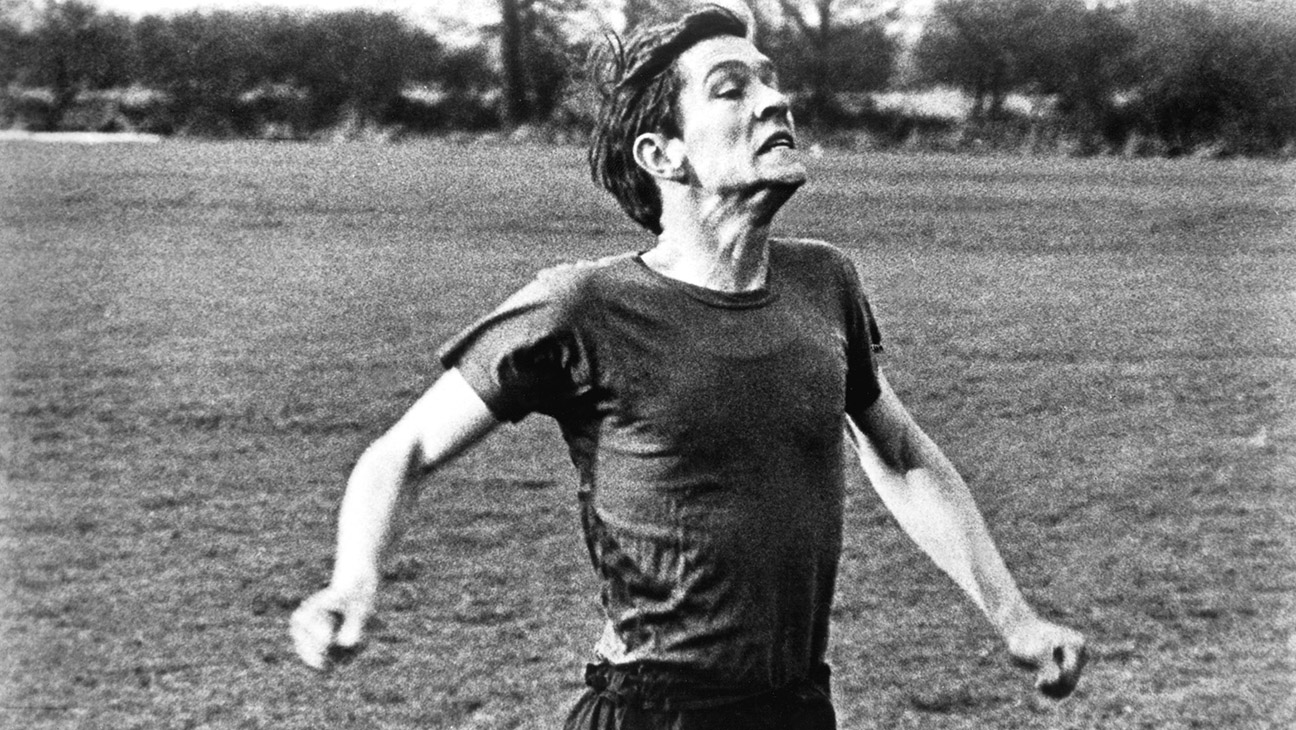
The Brits have a saying, “It’s grim up North,” which would perfectly sum up Tony Richardson’s kitchen-sink classic if the film weren’t also so deeply infused with humor and cheeky defiance. Tom Courtenay, endearingly surly and callow, stars as Colin, a kid from a Nottingham council estate who’s sentenced to a juvenile hall for thievery. The governor (Michael Redgrave) spots Colin’s talent for running, honed over years of high-tailing it from the law, and thinks the boy could win a race against some posh kids — or even become an Olympian. What’s so memorably great here — apart from the acting, cutting dialogue by Alan Sillitoe (adapting his own short story) and playful New Wave-inflected editing — is the film’s profoundly antiheroic spirit; it’s a very English two-finger salute to the establishment.
“”
-
“”
‘Bring It On’ (2000)
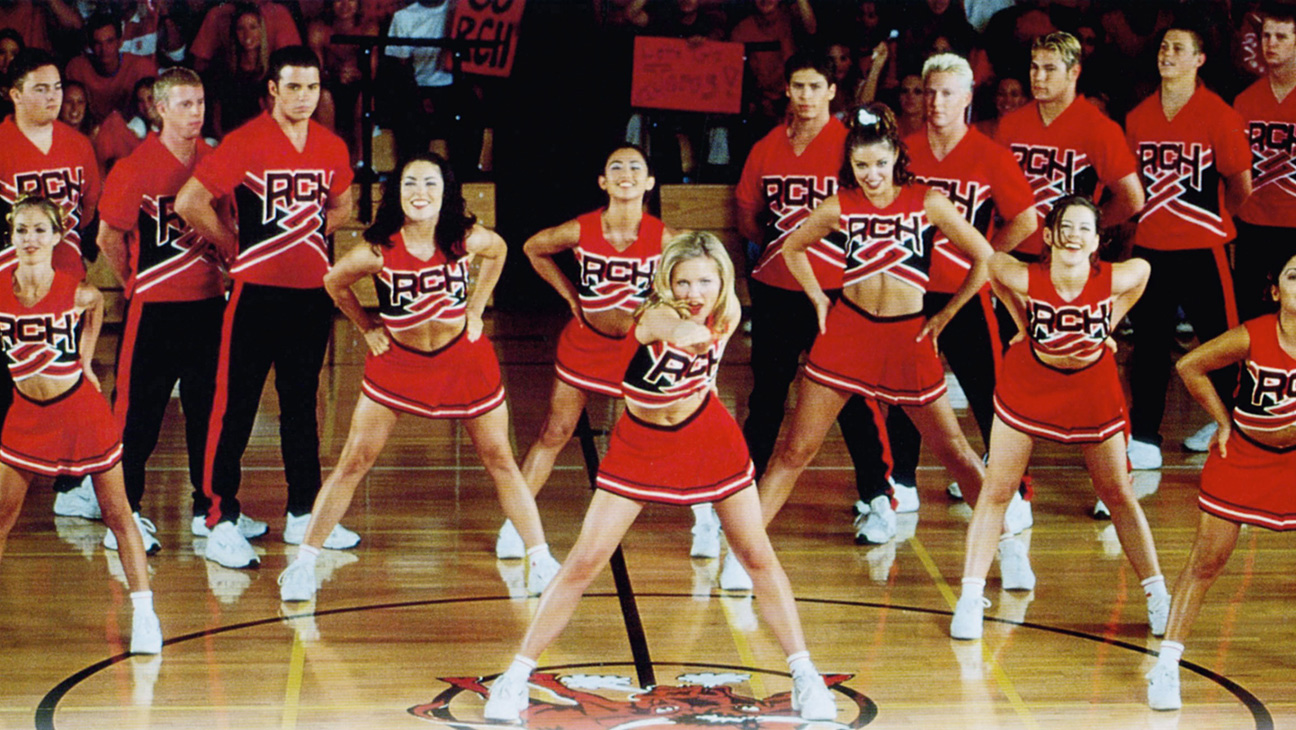
We may get some flak for ranking this classic teen-com about competitive cheerleading so high. But the delightful Kirsten Dunst vehicle stands up remarkably well; it even seems prescient in the respect it pays to cheerleading, a hot topic ever since Netflix’s docuseries Cheer threw a spotlight on how hard squad members train. Part of the delicious joke here is that the competition-topping high school squad Dunst’s Torrance leads is way more talented than the oafish football players they’re supporting. That said, Torrance’s Toros don’t have the style of the Compton Clovers (led by a luminous Gabrielle Union), whose hip-hop-inflected routines the Toros have been ripping off for years. Like the best femme-skewed teen films of this vintage, Bring It On strikes just the right balance between earnestness and snark, especially in the slam poetry of the cheers themselves. The movie also makes sharp points about cultural appropriation and white fragility without even using those phrases.
“”
-
“”
‘Rocky’ (1976)
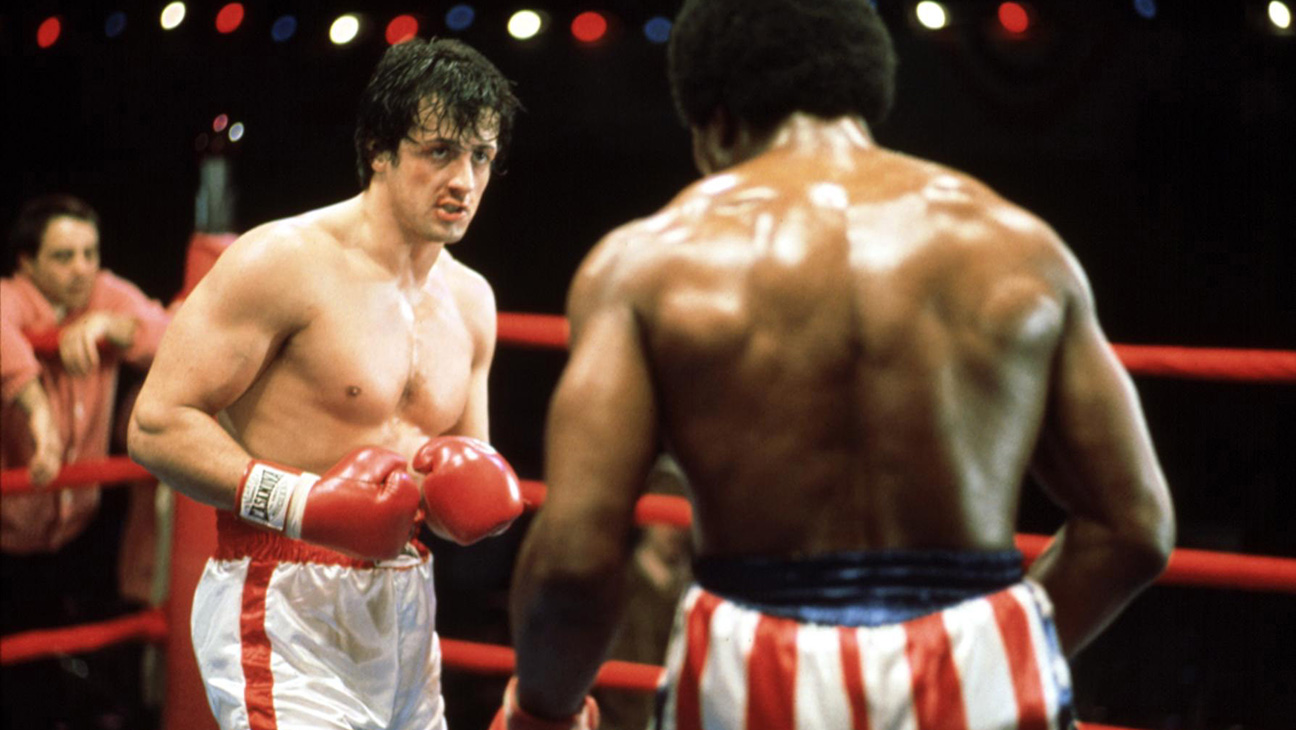
Eyes rolled when John G. Avildsen’s inspirational boxing drama won the best picture Oscar over the likes of Taxi Driver, All the President’s Men and Network. But the vehicle that made Sylvester Stallone a superstar — launching a string of sequels as well as a franchise of Creed spinoffs — has earned its enduring place in the pop-culture lexicon. Rocky Balboa, blinded by swollen eyelids at the end of a punishing fight, yelling “Adrian!” to his shy sweetheart in the crowd (beautifully played by Talia Shire) is as famous as Stanley Kowalski yelling “Stella!” in A Streetcar Named Desire. And there are few more iconic images of the underdog spirit than Rocky jogging up the steps of the Philadelphia Museum of Art in a training montage. As crowd-pleasers go, this rags-to-riches American dream story is as formulaic as they make ’em, but also as moving. Ask anyone to identify the opening bars of Bill Conti’s theme music; you won’t get many wrong answers.
“”
-
“”
‘Eight Men Out’ (1988)
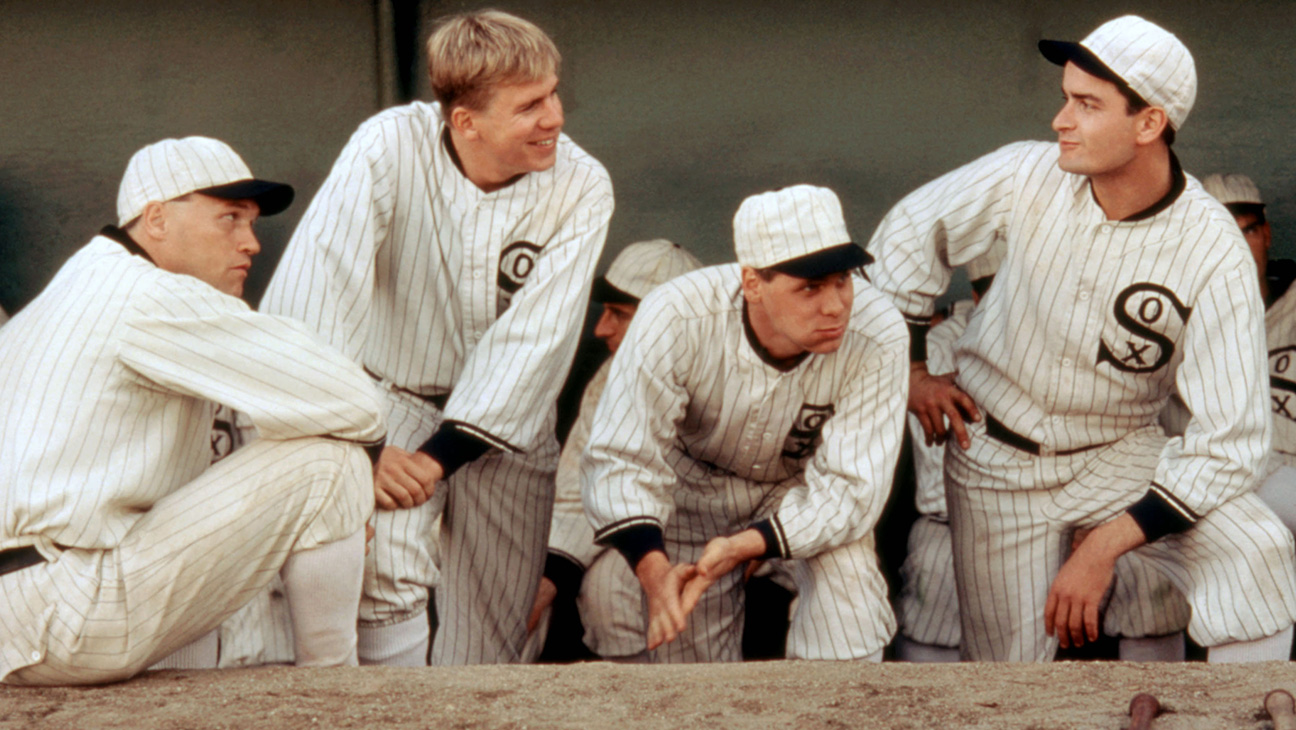
One of the greatest of all baseball films, John Sayles’ superb adaptation of Eliot Asinof’s 1963 book about the scandal surrounding the 1919 Chicago White Sox culls from a story so rich and sweeping it could easily fill an eight-part limited series. The movie brilliantly captures the friction of a sport at the tipping point between youthful idealism and corporatized commodification, delivering a pragmatic examination of the players’ motivations as well as a beautiful evocation of the post-Great War historical moment. Sayles, who’s also perfectly cast as sports journalist Ring Lardner, assembled one of his finest casts, with standouts including D.B. Sweeney as a guileless “Shoeless” Joe Jackson, David Strathairn as weary hurler Eddie Cicotte and John Cusack and Charlie Sheen as other members of that notorious team.
“”
-
“”
‘Breaking Away’ (1979)
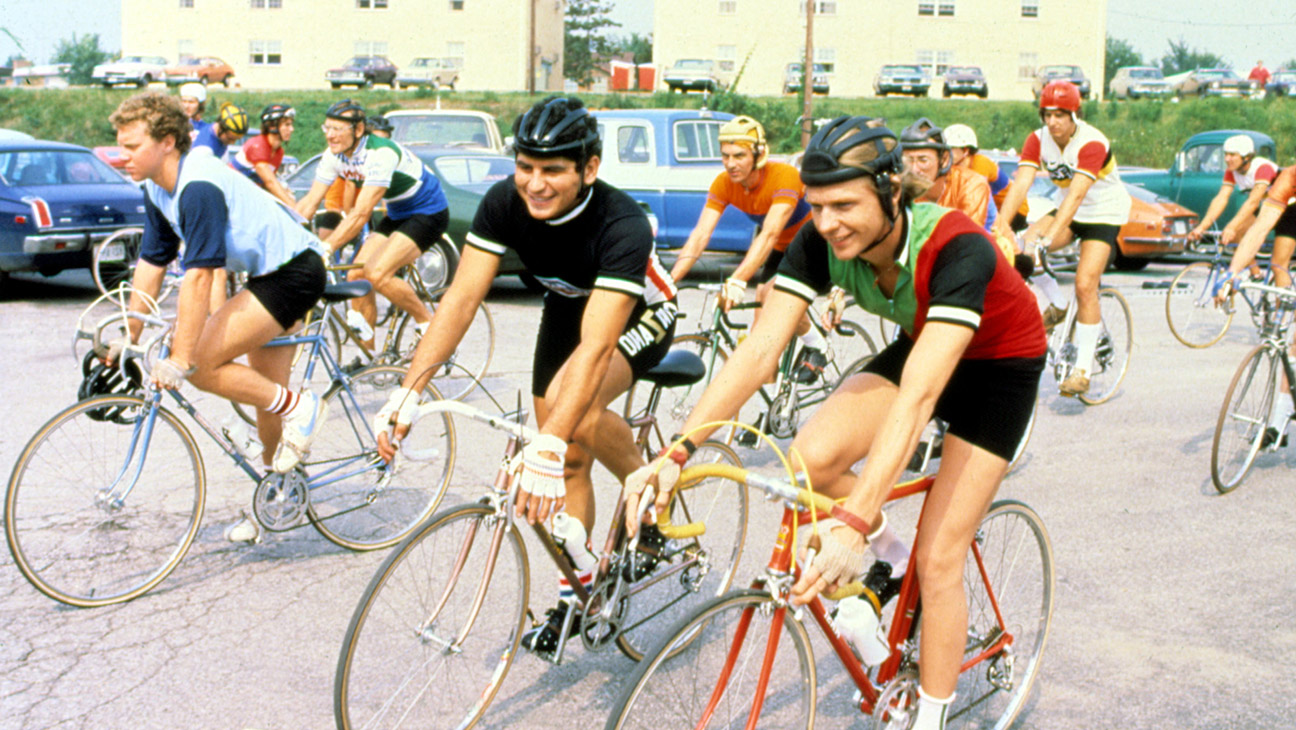
Playwright, novelist and screenwriter Steve Tesich saw six of his scripts become major films before his death in 1996, including an adaptation of The World According to Garp, a John Irving novel widely considered unfilmable. But Tesich’s Oscar-winning debut screenplay was his best, a deeply felt coming-of-age comedy-drama inspired by the writer’s time on a college cycling team in Bloomington, Indiana. A small-scale production with no marquee names (Dennis Quaid was still a newcomer, while Daniel Stern was making his screen debut), Peter Yates’ feature told a resonant story of blue-collar townies belittled by affluent frat-boy jocks. Dennis Christopher goes from insouciant humor to heartbreaking disillusionment as Dave Stohler, a former stonecutter’s son obsessed with Italian bicycle racing until he’s rudely awakened by firsthand experience of his idols’ tactics. In true uplifting, triumph-over-adversity sports film fashion, he bounces back in this funny, unpretentious and poignant jewel of a film, further elevated by wonderful turns from Barbara Barrie and Paul Dooley as Dave’s parents.
“”
-
“”
‘O.J.: Made in America’ (2016)
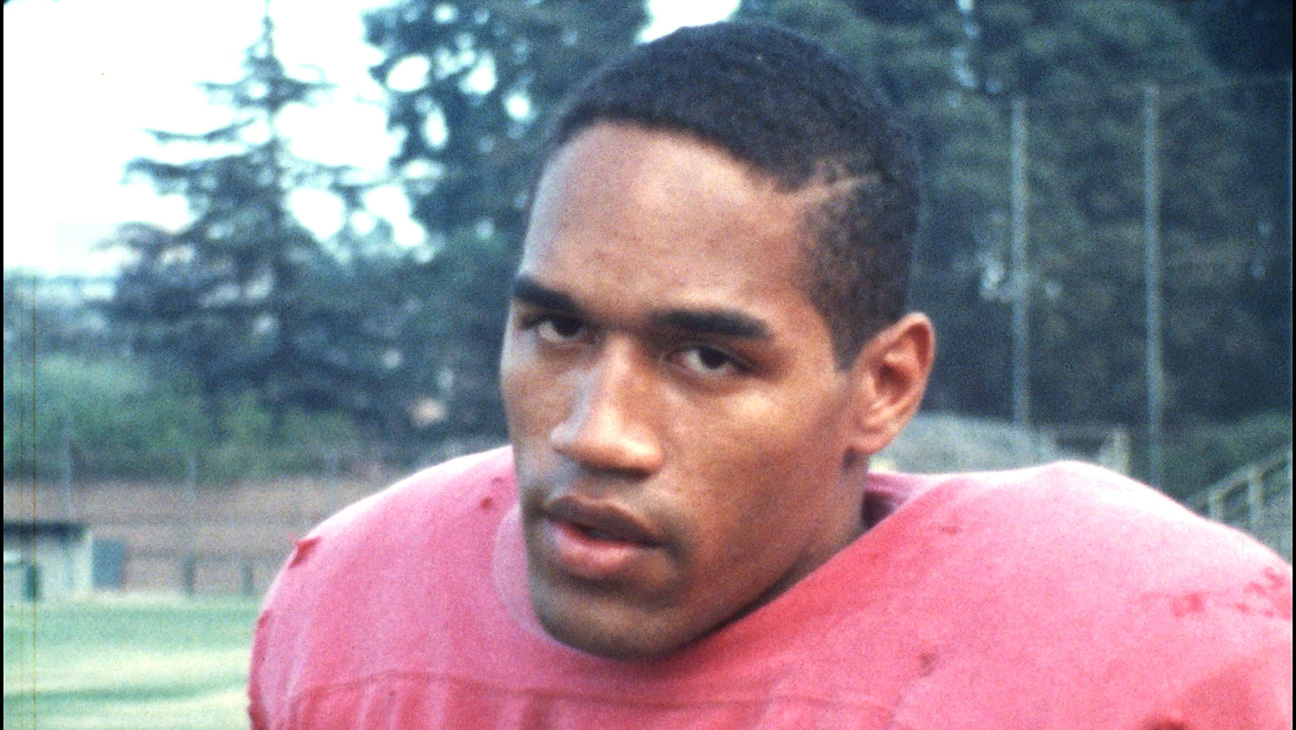
Although Ezra Edelman’s dazzlingly rich five-part doc about the rise and fall of O.J. Simpson was produced for TV under ESPN’s 30 for 30 banner, it took the unconventional path of carving out a theatrical release in order to be nominated for, and eventually win, both Emmys and an Oscar. That’s a function of strange eligibility wrinkles, but also of the utter excellence of the project, perhaps the definitive examination of the intersection of race, sports and celebrity in 20th century America. Edelman’s treatment of Simpson’s high-profile murder trial is terrific, but it’s ultimately just a small part of a tapestry of tragedy that the director ties to the Great Migration, the history of policing in Los Angeles, the rise of football as our most lucrative sport and much, much more.
“”
-
“”
‘Bull Durham’ (1988)
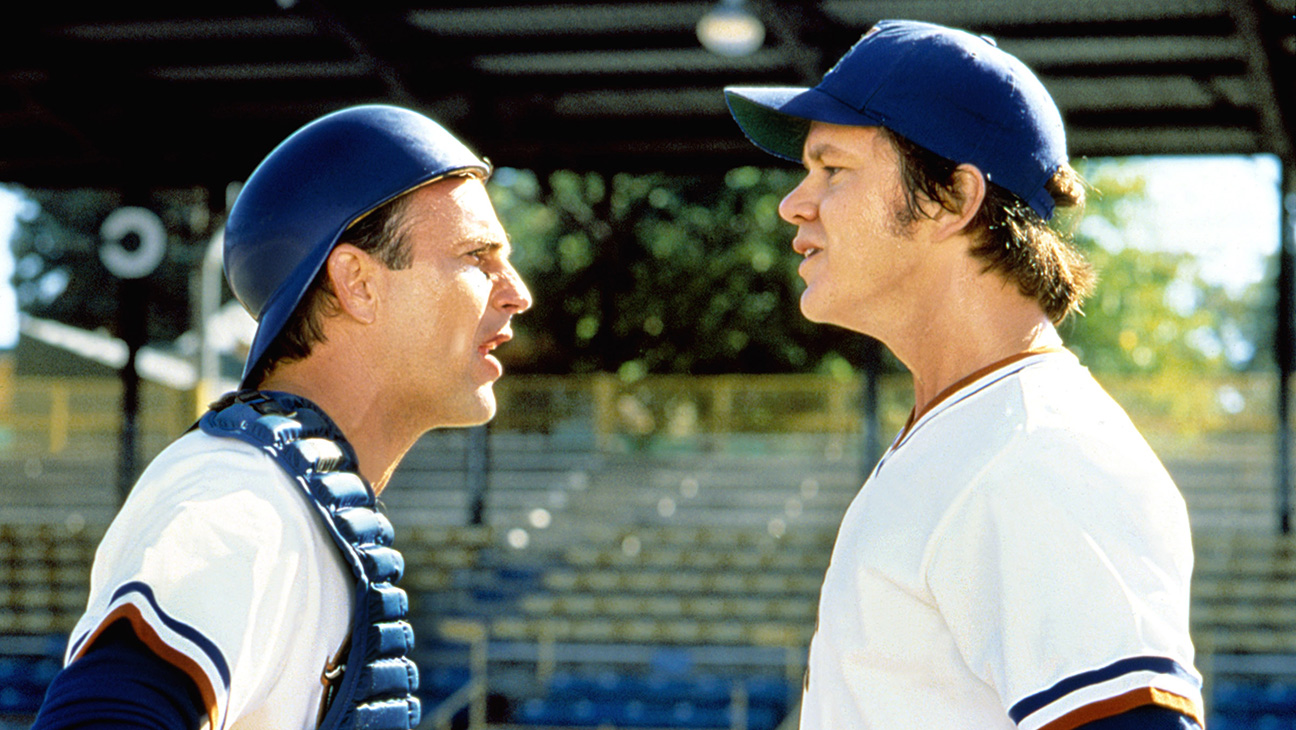
A relic from a time when Hollywood made sexy movies for grown-ups, Ron Shelton’s romantic comedy might be the only entry on this list that’s as much about a sports groupie as the sport itself. Emanating magnetism that ought to be illegal, Susan Sarandon stars as Annie Savoy, a self-appointed spiritual guru to North Carolina’s Durham Bulls, opposite Kevin Costner as “Crash” Davis, a seasoned player brought in as a catcher to instill control in the team’s hotshot rookie pitcher. That would be “Nuke” Laloosh, played by Tim Robbins with a hilarious mix of naivete and cockiness. Annie chooses him as her lover and recipient of her wisdom. But as Nuke acquires maturity on the field through Crash’s prickly mentorship, the attraction between the catcher and Annie becomes impossible to ignore. Sure, Nuke has a “million-dollar arm,” but can he dexterously unsnap a garter belt, paint a woman’s toenails or cause the furniture to rattle during sex? The movie’s love for America’s national pastime is matched by its insightfulness about relationships.
“”
-
“”
‘When We Were Kings’ (1996)
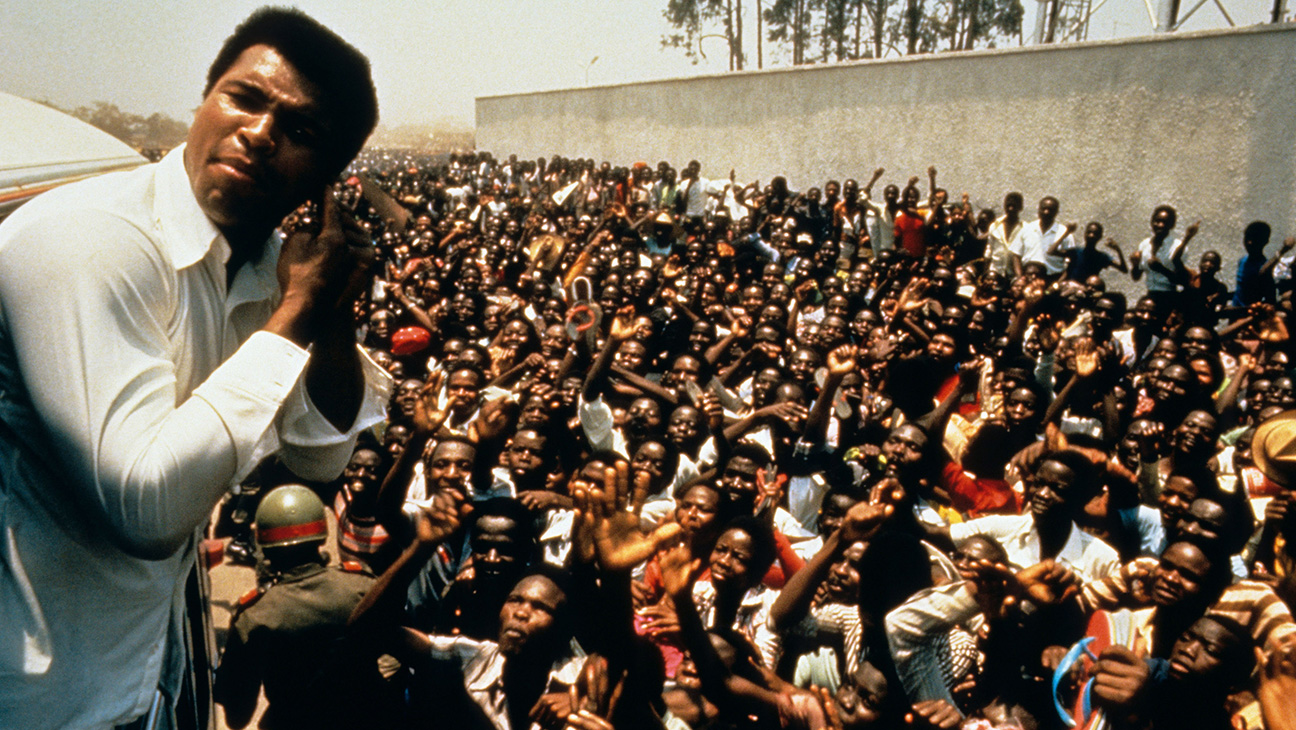
A case could be made that if you truly value the sports in sports movies, then nothing beats documentaries: That’s where you really see the talent, skills and grace that make great athletes worth watching; actors (with assists from editing and direction) can only approximate. When We Were Kings proves the point. There can be no substitute for the footage of the historic 1974 fight in Zaire, the so-called Rumble in the Jungle, where two titans — then-undefeated George Foreman and Muhammad Ali, a former champ still called The Greatest but considered past his prime — slugged it out on live TV. Director Leon Gast’s doc, 22 years in the making, is a celebration of these boxers’ prowess. Interviewed eyewitnesses include Norman Mailer and George Plimpton, who analyze the men’s strengths and strategies with expertise you don’t often hear outside sports commentary. But this face-off was about so much else: politics on macro and micro levels, the discourse around race in 1974 (which Spike Lee perspicaciously dissects), idealism and capitalism. The material is phenomenal, so it’s a good thing the filmmaking is up to the task — especially the editing, which adds a sizzle as succulent as a steak on a George Foreman grill.
“”
-
“”
‘Hoop Dreams’ (1994)
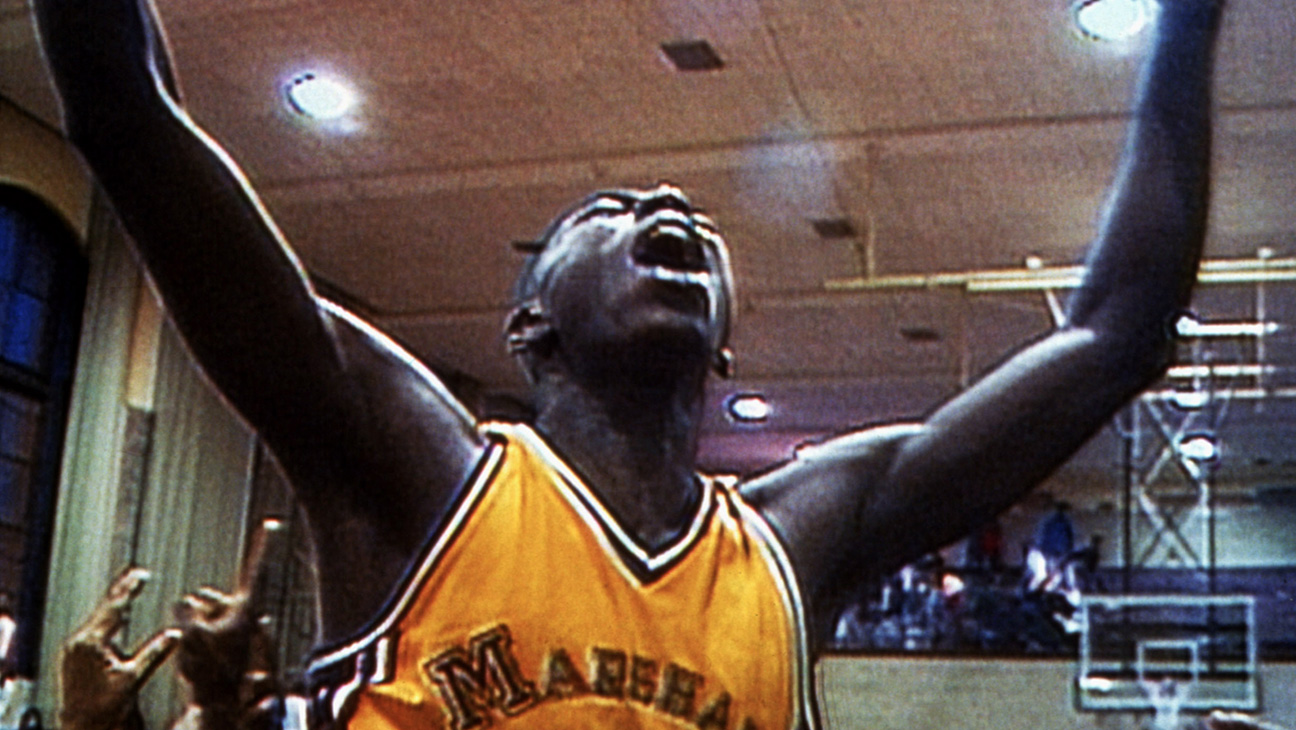
When Steve James’ incomparable three-hour basketball documentary hit theaters in 1994, it was something of a bombshell. Not only did the movie offer up a rare inside look at two young inner-city ballers struggling to make it at a moment when NBA players were turning into global superstars; it did so over the course of four years, meticulously chronicling the teens through the ups and downs they faced on and off the court — especially as kids hailing from Chicago’s notoriously rough Cabrini-Green projects. At once compassionate and unwavering in its depiction of raw talent and dashed hopes, Hoop Dreams set the tone for the kind of sociological sports docs (Last Chance U, etc.) now popular on streaming. It also revealed a truth so many aspiring hoopers must face: Not everyone can be the next Michael Jordan. In fact, some of the very best will never make it to the pros.
“”
-
“”
‘Raging Bull’ (1980)
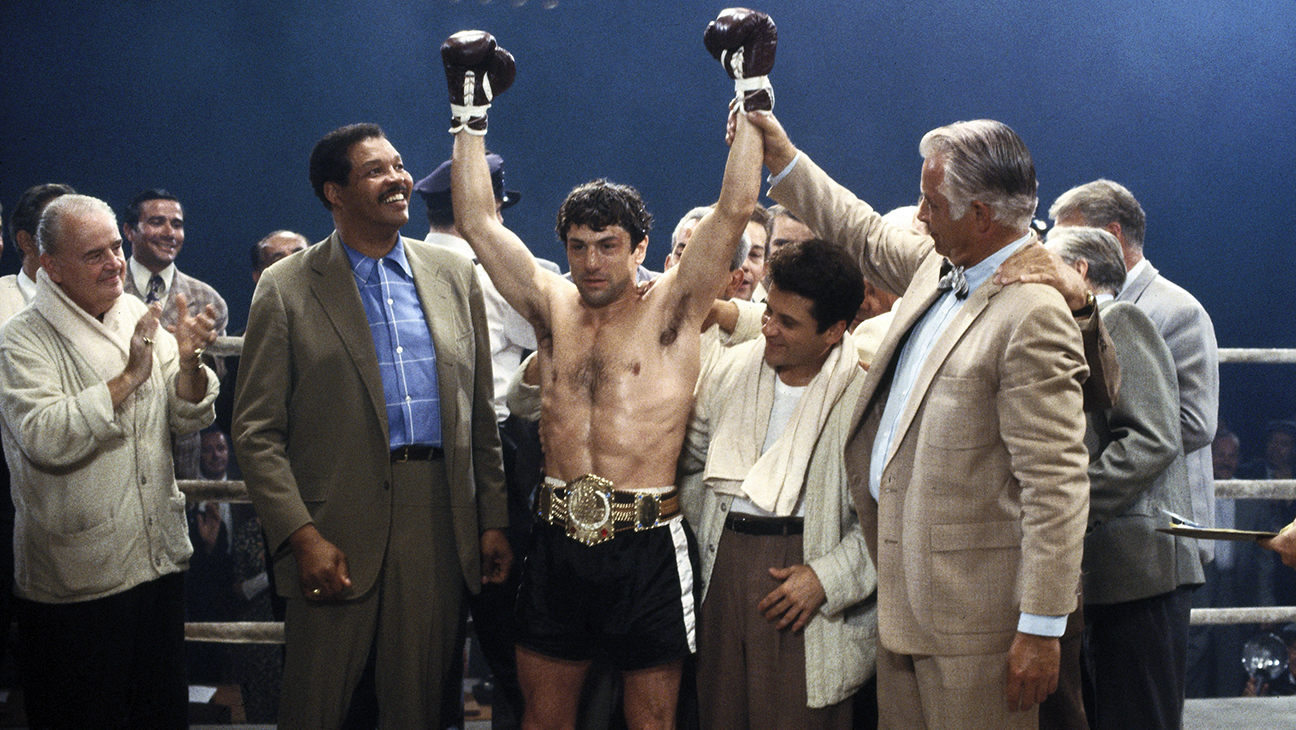
Martin Scorsese’s boxing masterpiece is many things: a knockout drama of raw violence and shattered dreams; a midcentury chronicle that takes us from the Bronx to Miami and back again; a real-life tale of family bonds torn apart by money, corruption and testosterone; and a redemption story in which redemption never arrives. After trying his hand at a musical (New York, New York), a rock doc (The Last Waltz), a small-time gangster flick (Mean Streets), a heartland drama (Alice Doesn’t Live Here Anymore) and a portrait of urban psychosis (Taxi Driver), Scorsese landed on the perfect genre to make his very best movie — one that brilliantly shifts between lyricism and realism to tell a story of athletic greatness marred by deep inner anguish.
Ironically, this wasn’t even a film the director wanted to shoot. He turned down the project — brought to him by Robert De Niro, who had the rights to Jake LaMotta’s biography — several times, convinced he couldn’t pull off a boxing movie. But after his own fall from grace, including surviving a drug overdose, Scorsese saw a part of himself in LaMotta’s tragic life, while De Niro sensed the role could be one of his greatest, which it was. All the titles on our list are more than just great sports flicks, but this one is personal filmmaking at its most glorious.
“”
Source: Hollywoodreporter
HiCelebNews online magazine publishes interesting content every day in the movies section of the entertainment category. Follow us to read the latest news.
Related Posts
- HBO Max Shares First Footage From ‘The Pitt’ Season 2: “And So It Begins”
- What’s Up With App-E, ESPN’s New and First-Ever Mascot
- Ejae on Hitting No. 1 With 'Golden,' ‘KPop Demon Hunters’ Success
- Jillian Michaels Breaks Silence Over Netflix’s ‘Biggest Loser’ Docuseries
- ‘Etoile’ Cinematographer David Mullen Dissects His Favorite Shot, Filled with Red Lights and Smoke





